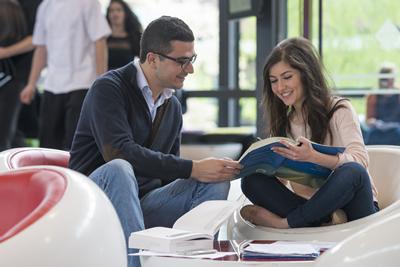Wellbeing Support
The University offers a variety of wellbeing support. Take a look at some of the wellbeing support available to you.

We know that starting university is a big step, one that often begins a long time before you finally arrive on campus. On this page you will find resources, tips and advice for you and your supporters to aid you with your transition to University life.
The guide below will help you to understand the terminology used at university and how to access support from the University of Southampton.
It is natural to feel anxious about starting university and there are some things that you can do to help prepare yourself.
It is beneficial to obtain as much information as possible. You could try to find out the following:
You could find this information through:
It is also worth thinking about how you will plan your own study, as organisation is important.
You could:
Everyone responds to change in a different way - be kind to yourself and understand that other people will be going through similar doubts and anxieties as you are. It will take time to fully adapt and to develop your coping strategies.
It is important to look after yourself physically and mentally and to engage with the five ways to wellbeing. You could:
It’s important to find the right balance between study, leisure activities and the domestic tasks associated with looking after yourself.
Remember that the pace of university is quite different to what you may be used to, and you will most likely be moving through course materials quickly, which can make you feel left behind. The expectation is that you will be completing your own reading and research in-between lectures and seminars but make sure that you do not over-work yourself. Rest breaks and leisure activities are important to ensure a healthy balance and to help maintain your wellbeing.
You can always seek help and support from your Personal Academic Tutor as well as the academic staff of each module you study.
It is not an easy thing to move away from familiarity. Ensure that you take the time to explore your new environment to ease yourself in. Check out the University's online campus tour, where you can prepare in advance to find places you will need to use. Or if you are able to, come visit the campus for yourself. We suggest finding your faculty office, the library, The Student Hub (where you can also access the Student Disability and Inclusion and Student Wellbeing teams), the Students’ Union, shops, cafés and toilet facilities.
Making new friends can be daunting and a challenge in the first few weeks. Make sure you look after yourself and ensure you take things at your own pace. Here are a few suggestions on how to start engaging with other students:
It’s very common to feel homesick or lonely, especially if this is the first time you have lived away from home. Suddenly you are in new living and studying environments and you are away from your old friends, family and support network. Just knowing that this is normal can be a great help and you have time to think about this and discuss this with your family before you join university. Just thinking of a few strategies that might help you settle in could make a real difference. Here are a few suggestions:
We know that going to University can be a big change. We offer the opportunity for parents, guardians or supporters to have a 15-minute online chat with one of our team to answer any general queries or concerns you may have regarding student support.
Please be aware that we will be unable to discuss specific student situations unless permission has been granted to do so by the student. If students would like to provide consent to share, they can get in touch with us via The Student Hub.
Dates and timings
Thursday 14th September:
12:00 - 14:00.
18:00 - 20:00.
Friday 15th September:
14:00 - 16:00.
18:00 - 19:00.
How to book
The booking system is now closed.
Microsoft Bookings guidance
If you are unfamiliar with using Microsoft Bookings, please see our ’how to’ guidance document.
The University offers a variety of wellbeing support. Take a look at some of the wellbeing support available to you.
Find out about the support available within Student and Education Services.
Support and advice for any student accommodation queries .
Support and advice on student fees, funding and managing money.
Explore the University’s Student Life webpages to get a feel for life as a University of Southampton student.
For further useful resources on how to better prepare yourself for university life, please check out the links below:
The University cannot accept responsibility for external websites.